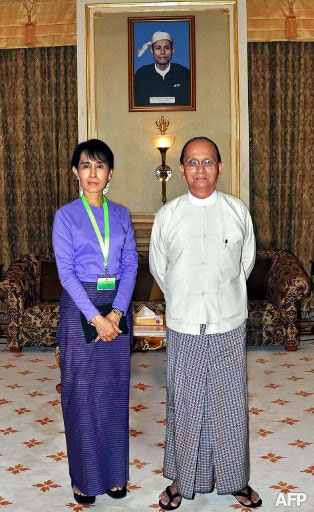
Aung San Suu Kyi and
President Thein Sein after a meeting in Naypyitaw. In the background is a
picture of Suu Kyi's father, Aung San, who is widely admired as the
father of the country.
Thein Sein is expected to attend the forum, said a spokesperson for the National League for Democracy. There has been no confirmation by the government that Thein Sein would attend.
The forum is expected to focus on issues affecting the 10-member countries of the Association of Southeast Asian Nations (Asean), which together form an important strategic and economic region with a combined population of over 600 million people, a nominal GDP exceeding US$ 1.8 trillion, and a growth rate for the region expected to exceed 5 percent in 2012 despite ongoing economic turmoil in the Eurozone and the United States, according to the event’s website.
The Asean Economic Blueprint has established concrete targets to form a single market and production base by 2015.
To achieve this stronger linkages across Southeast Asia are needed to ensure a competitive and connected region, as well as to reinforce ongoing integration efforts.
The region’s connectivity will see a major acceleration in linking the region’s institutional and physical infrastructure, presenting unparalleled opportunities for investment and growth in areas such as the transportation network, energy, mobile health, tourism, financial services and agriculture, said the website.
At the same time, corporate and government decision-makers must ensure that the necessary risk response mechanisms are well developed to manage such issues as natural disasters, widening income inequality and resource scarcity.
As demonstrated by heavy flooding across the region last year, vulnerability to climate change has led to significant disruptions to the region’s production and supply chains and exacerbated socio-economic disparities.
Among the issues expected to be discussed are:
- How can the high economic growth economies of ASEAN help to rebalance both the global and the regional overall economic outlook?
- How will governments and institutions develop the financial policies to manage inflation, capital outflows, commodity price volatility and balanced growth towards greater domestic and regional demand?
- How will the region leverage its demographic dividend and technology base to develop the models to increase growth through innovation, improve talent mobility, entrepreneurship and skill building?
